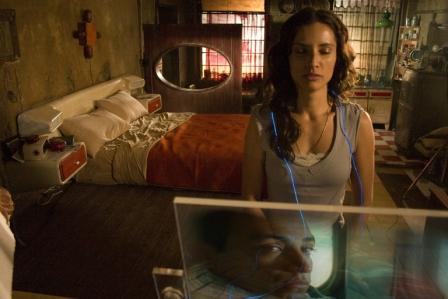
Alex Rivera describes his latest film, Sleep Dealer, as a film about "globalization on acid." As science fiction it deals with the future from a Humanist point of view and has been compared with the works of Darren Aronofsky and Andrei Tarkovsky.

It will be screened at the upcoming Moving Image Film Festival at the Bioneers Conference in the Bay Area and it opened at Sundance earlier this year to rave reviews. Rivera, who sees himself as a "digital media worker," says his film is, "A film of ideas that has some action, some killer VFX to support the thinking of these characters who live in a part of the world [the developing world] where we've never seen the future before. It also has some cool explosions in it and some nicely made robots as well as exciting visuals."
The low-budget film has 450 effects shots in it and was filmed on location throughout Mexico. Rivera is the first to acknowledge that the film's polish, its "rad VFX were the result of lots of friends' help." He's also the first to reveal that it was 10 years in the making and credits producer Anthony Bregman (Eternal Sunshine of the Spotless Mind) with helping to get things done for nothing. The Sundance Institute, says Rivera, was also "hugely helpful."
Globalization on acid is how Sleep Dealer conceptualizes its premise of Third World workers who connect their bodies to the net and then, via robotics, control a drone that drives the taxi, mows the lawn, picks the fruit in the developed world. "I'm ripping the POV of the future out of the First World," says Rivera whose trans-border family is of both American and Peruvian descent.
Translated, what that scenario looks like is this, explains Rivera: Currently immigrant workers who perform menial labor in a developed country must still be cared for in terms of food, health, housing. In this scenario, the physical body of the worker remains in the 3rd world where they connect their nervous systems, via computer "nodes," to the net whereby they control drones, or robots, in the developed world which then perform these menial tasks. This "technology" eliminates the need for care of the physical body or any other attendant "immigrant" issues.
"I'm critical of technology in a new way but I'm not anti-technology," explains Rivera. "Sleep Dealer looks at how a connected planet gets strange. Example, we are now in a race to the bottom." This is evident in that Americans who answer phone calls now have to compete against East Indians who answer phone calls. This type of connectedness gets risky. From the point of view of war, remote robotics is real. Drones, which are controlled in Las Vegas, are flying over and killing people in Iraq."
Rivera is intrigued with how technology is running both backward and forward at the same time. He says that technology is both "liberating and alienating." It's liberating he says because it allows you to share information, share stories such as a blogger in Iraq can share their experiences. "There are two scenarios in technology simultaneously; Connected and alienated vs. Connected and liberated."
Rivera, who melted the disciplines of Political Science and Documentary Theory when he was getting his degree, predicts that as we get closer to the machine, we will be seeing things on our screens in more immersive ways. "The characters [in Sleep Dealer] are connecting their nervous systems to the net. What's different is how my characters interact with the technology tools. My main character gets a 'node job.' For me a lot of the film is funny. I was aiming for that. I'm the type of person that when this world pokes at us, or when we're getting poked in the eye by the economy, for example, I react by laughing."
"Sleep Dealer is not a muckraking expose film. It is something radically new for Sci-Fi but still a part of the tradition of political satire such as Bladerunner, Brazil, Modern Times, 1984," elaborates Rivera. "I use parody, satire and exaggeration to comment on where we're going. The film is not dogmatic."
Some of the big issues Sleep Dealer examines are outsourcing, corporate ownership of water, remote warfare, confessional internet diaries and military contractors who are accountable to no one.
"When you look at the future from the POV of the South, labor, migration, border security...all these issues, including privatization of water, waterworks, aqua terrorism loom large. These are background elements in the film. Borders have already been crossed by corporations. For example, North American and European water companies, scouring the globe for water, such as Bechtel in Bolivia. This is one of the very few countries where the people have actually won their water back," explains Rivera.
"In our world the free market is the only system we have to organize the world. In 2008 we have technologies like remote control drones patrolling the U.S.-Mexico border. Humans, who are literally carrying water on their backs, are being surveilled by $15 million drones. These scenarios are unimaginable in their contrasts and absurdities."
"We're living in a world right now that looks like science fiction. It's a Mad Max scenario. It's our reality, it's in the news, you just have to look and recognize it. What's next? Privatizing the air?" asks Rivera.
Lisa Rinzler was Cinematographer on Sleep Dealer. Visual Effects Supervisor was Mark Russell.
Sleep Dealer is screening at the Moving Image Film Festival Friday October 17th at 7:30pm in the Showcase Theatre which runs in conjunction with Bioneers Conference taking place October 17th -19th in San Rafael, California.